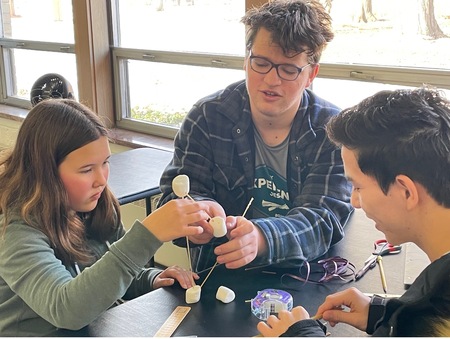Classes That Build Teamwork

One of the most important benefits homeschooled students gain from attending in-person classes is learning to work well with peers. Employers in all fields seek students who can practice effective teamwork. No matter how competent and smart people are, they need others to accomplish their goals. Employers know that teamwork produces greater efficiency and productivity, sparks creative solutions, and forges strong relationships that improve everyone's job satisfaction.
At Mid-Metro Academy, our core academic classes--English, science, social studies, and foreign languages--all include group learning activities that help students develop teamwork skills. Beyond those opportunities, these specific classes emphasize group projects where students practice collaboration.
(Teacher and suggested grade level follow course title.)
Group Music Classes
Band Ensemble 1 and 2 (Andrew Thoreen, 5-12)
One of the best ways students can learn teamwork is by playing music together. Students must tune in to their fellow musicians, take cues, and adapt in response. In this small ensemble class, students will learn and perform contemporary Christian songs while gaining experience writing and arranging original music.
Group Ukulele, Guitar, or Piano (Andrew Thoreen, 5-12)
Learning to play an instrument in a group lesson is less threatening, more motivating, and more fun. Students help and encourage each other as they learn together.
Acting
Intro to Acting (Julie Thoreen, 5-8)
Students explore acting, movement, musical theater, and improv through playing theater games, acting out scenes, and practicing basic performance principles. Acting requires students to attend carefully to their fellow actors, modify their own actions accordingly, and cover for their peers when something goes wrong.
Acting Techniques (Josh Cisewski, 7-12)
Students with some acting experience or those who want more challenge will benefit from this class. As they act out scenes, skits, and improv, they'll explore the differences between acting on stage and on camera. They'll discover the importance of diction in speech, what their body language communicates, and other helpful tools for communication, conflict, and self-expression--all of which help them function as a team.
SciGirls (Leslie Kleppe, 5-8)
SciGirls is a hands-on, collaborative class that gives girls ages 10-15 the opportunity to gain confidence in the sciences. Through experiments, challenges, and career exploration, the girls gain new insights into various scientific fields. It's a fun class that helps girls build friendships as they learn.
Gym & Fitness (Joe Eckes, 5-12)
Obviously, sports are the quintessential way young people learn teamwork, and now they can do that at MMA. Students will study and play traditional sports, learn about schoolyard games from around the world, and even learn how to make functional sporting equipment from materials easily sourced from the hardware store.
Culinary Arts (Becky Mahoney, 5-8, 9-12, and Michelle Manke, 5-12)
Working on a team of cooks requires performing different roles cheerfully, paying attention, assisting others, and responding to mix-ups and messes. Since many young people begin their work experience in food service, these experiences can be especially practical preparation for employment.
Economics (Vicky Sandberg, 9-12)
One reason Mrs. Sandberg is such a beloved instructor at MMA is that she incorporates simulations and group activities that clarify difficult concepts. High school students need economic instruction, and this is perhaps the least painful and most effective way to get it!
Study Skills (Rebecca Hope, 7-12)
Teamwork is essential for success in school as well as in the workplace, so Mrs. Hope includes lessons and activities that help students improve listening skills, read body language, and solve problems with teammates. In this interactive class, students practice memory, study, and comprehension skills with partners and teams.
Read! Think! Write! (Rebecca Hope, 9-12)
This literature class makes heavy use of small group discussions and projects. After students read the literature each week, they work with different partners and clusters to develop creative and insightful responses to the themes and characters. Often they must persuade others of their positions so their group can present a cohesive answer.
Find complete course descriptions and register HERE.

